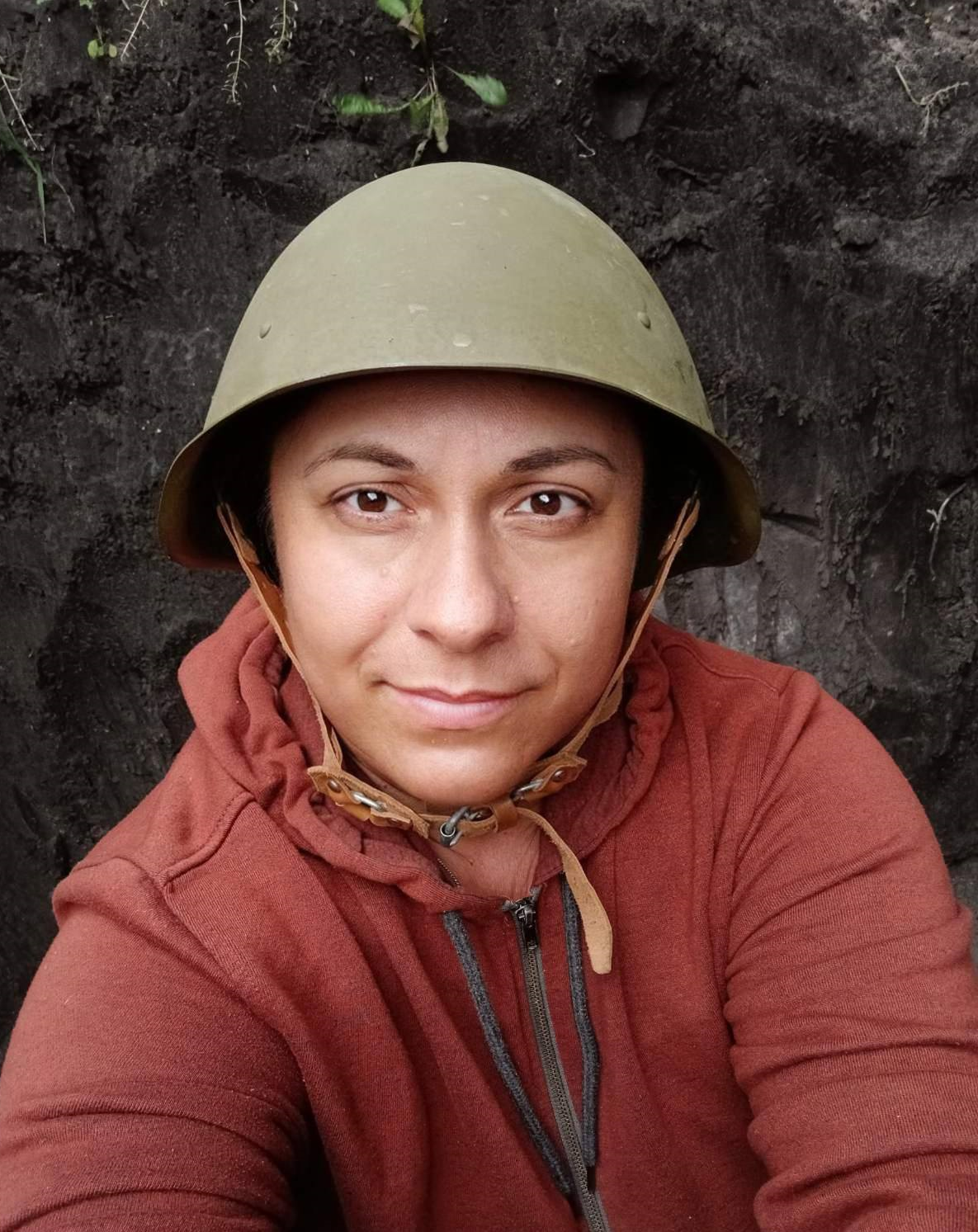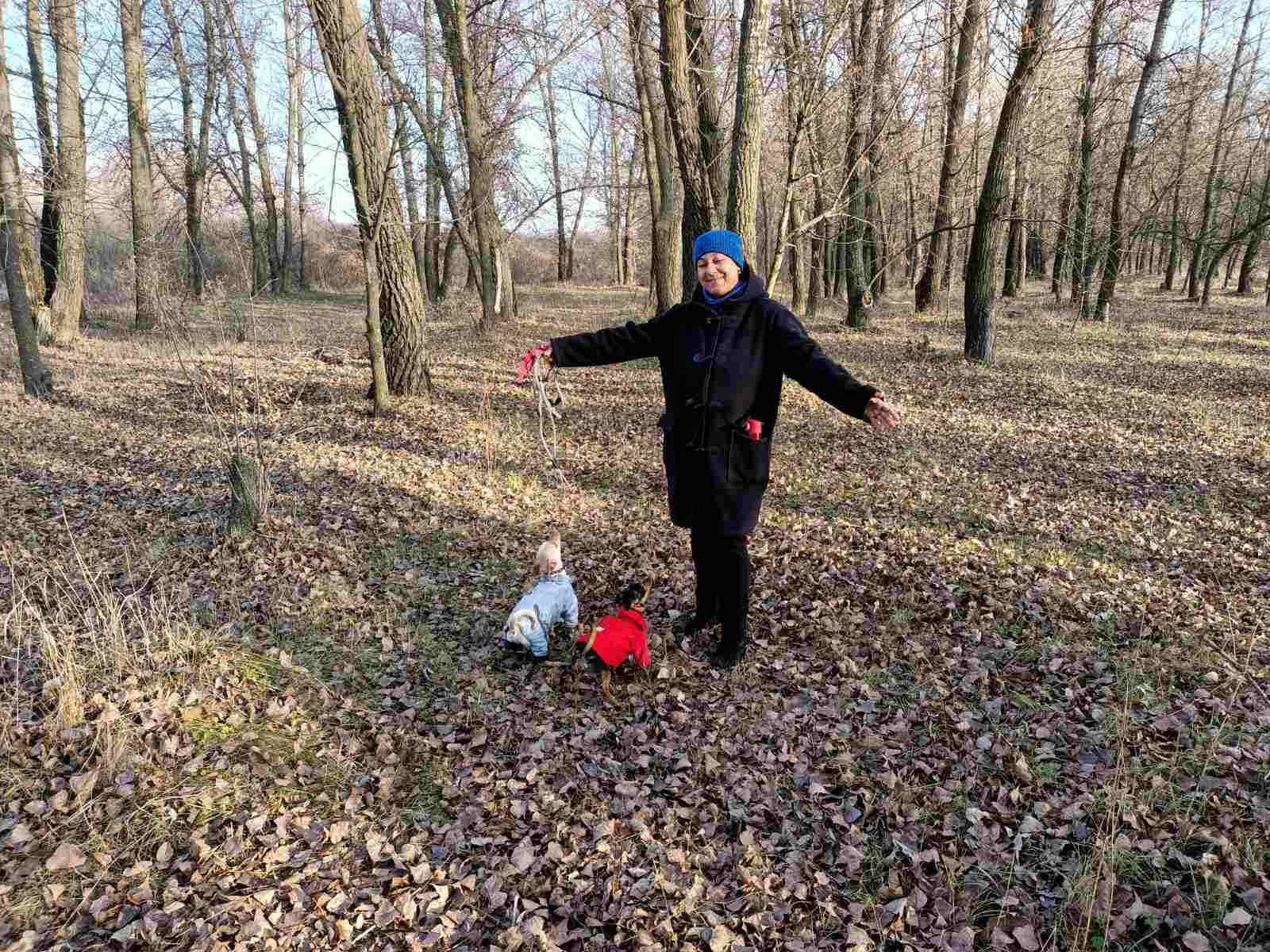Interview 17. Always be ready. Oksana Bilobrov
It is necessary always to be ready for war; at the same time, the war mustn’t replace the whole life of children – this is the opinion of Oksana Bilobrov, a graduate student and teacher of physics, computer science, and astronomy from Kremenchuk. At the beginning of the war, Mrs. Oksana could unite her family and secure it quickly. At the same time, Ms. Oksana sees a dangerous trend in the city’s education — an attempt to abandon the New Ukrainian School and return to the old soviet system. Oksana Bilobrov considers such steps disastrous for Ukrainian children, who must be given a choice.

The Main Lesson
We must always be ready for war. For now, this is the main lesson I decided to pass on to my children and grandchildren. I believed in the future and considered myself a developed, peaceful person. But, as the events of February 24 showed, it turns out that it is not a pretty good thing to be such a person. I did not believe in the possibility of war until the end. I actively studied and wanted to improve myself. It all collapsed in one day.
I have already bought helmets for all my relatives; I am collecting funds for a bulletproof vest for my daughter. After our victory, I will get a permit for weapons; I will definitely buy them and train regularly. And I will order the great-grandchildren – you must always be ready.
Rapid Mobilization
I was expecting everything but not despair or hopelessness. When relatives called at six in the morning on February 24 and told us about the shelling of Kharkiv and Kyiv, we gathered the whole family by phone in literally two hours. My older children live in different places; my husband, younger daughter, and I live in the center of Kremenchuk. So, we packed up, and together with our four cats, two adult dogs, and three puppies, within three hours we were in a safer place where we felt protected. I am proud of the fact that I was able to pull myself together and do everything clearly.
We all work for our victory, for our front. We moved to live outside the city, and people who left Kharkiv lived in our apartment. It may not be such a significant contribution, but I hope that everyone is doing what they can in their place. Of course, we volunteer, share everything, and promptly help those forced to leave their homes. Today I took my daughter’s things to a five-year-old girl who doesn’t have them. We are also equipping our country house so that people forced to move from their homes can live there.


We moved to live outside the city, and people who had to leave Kharkiv lived in our apartment. We are also furnishing our country house so that someone can live there as well.

With Own Hands
One of the significant challenges of the Kremenchuk community was the lack of an alert system. Our city is large, almost 20 km long. And only a few weeks after the start of the war, they were able to set up alerts. We also do not have bomb shelters. Half of them were closed altogether; people took chainsaws, knocked down old locks, and arranged everything themselves. The local authorities are accused of being unprepared; I also see they did not prepare for war. The territorial defense was not formed at all. In the first days, we carried tea and food to checkpoints. We still continue to do this; we are still collecting money for plate carriers and thermal imagers.
The volunteer movement has shown that our people are a great force. Today, a single volunteer community has already formed in our city. We will not surrender the city.
Past and future
I don’t want to burden my daughter with wartime memories. Because my mother and father survived the tragedy of the Second World War. Two grandfathers fought and had orders and medals. After returning from the war, they talked a lot. In 1941, the unit of one of my grandfathers was the last to leave Kremenchuk and blew up the bridge so that the Germans would not pass there. Mom was evacuated to Tajikistan; dad lived under occupation in Kremenchuk. And believe it or not, the Germans did not do what the russians are doing now. Dad said that the Germans prepared food for the children. Entire houses remained intact, even some livestock and poultry remained in the villages, and people could survive. And what is happening now is absurd.


And believe it or not, the Germans did not do what the russians are doing now.

Rise from the Ashes
I have had an opinion for a long time, for which I found confirmation. Carl Gustav Jung, a Swiss psychologist, spoke of the magical phoenix bird, which symbolizes the liberated soul. I associate this bird with current events.
I hope our souls are being purified now. We were to pass this test, be reborn like a phoenix bird, and become a new, hardened nation. We are Ukrainian phoenixes.
On Our Own Land
In our family, I am a resource for everyone. I am always ready to share, to give a part of my energy to support my relatives and friends. When I give, I get a resource; it has been like that for a long time. And since the beginning of the war, land has also become my resource. When we were deciding what to do: leave or stay, I said that Ukraine is my land, from where I will not go anywhere. Now I have a bag of ground that gives me strength. And although we often have air alarms and bad news, we are on our own land. The first thing we did was to dig up our house, and now we are ready to defend it in trenches. We hold onto and draw resources from our land; we use grounding techniques. However, it depresses the soul that not everyone can do it.
Educational Front
Poltava region borders the frontline regions of Ukraine, and the cities of the region, particularly Kremenchuk, regularly suffer from shelling. On June 27, a fierce rocket attack on a local shopping center caused dozens of casualties and victims, including a student and acquaintances of Oksana Bilobrov. The city government of Kremenchuk is leaning towards an online format in the new academic year, given the difficult security situation. In order to help Ukrainian educators to continue teaching children during the war, the EdCamp Ukraine community launched a crowdfunding campaign — collecting funds for computer equipment and Internet access for those teachers who lost teaching equipment due to the war. The collected funds are also planned to be used for psychological support for teachers and to organize conferences where they can share their teaching experiences during the war. Both citizens from abroad – on the GoFundMe platform, and Ukrainians – on the EdCamp Ukraine page, can join the campaign by adding the comment “My war. Lessons” to the payment.
Save Life
In the first week of the war, it was very difficult, but my resource was advanced training courses, as well as teaching at the EdCamp Academy. I had a course of 12 classes in physics, thanks to which I showed this subject from a completely different side. My classes were not about what the student should know and do according to the curriculum but about critical physical phenomena and concepts with applied meaning. I told the children about radiation protection or the importance of inertia. For example, a simple wooden board is enough to stop an object moving inertially, and it can save a life.
I think it’s an invaluable experience to completely reorient children to the facts that can save their lives. I would like to share with foreign colleagues the methodology of such classes so that students can be saved in this difficult wartime.
Learning Realities
Last year I entered graduate school, and January 18 was my last day at school. I saw my future in preparing a dissertation, the topic of which had already been approved. I planned to study and devote myself entirely to research work. Now everything has changed, and I want to go back to school.
My daughter is nine years old; she is a student in the fourth grade. When she started studying at NUS, one year was enough for me to evaluate the implementation of the reform at the school. So far, I do not see such a school in our city that would really work according to the standards of NUS. I am personally not satisfied with the education in Kremenchuk.
My daughter has been homeschooled for three years now; I teach her myself. For now, I can give my daughter more. At the age of four, she already made a 20-slide presentation with screenshots of her favorite cartoons; now she is fully proficient in the blind typing method on a computer and reads up to 300 words per minute. After the summer, I hope to leave homeschooling.
War is war, and communication is and will be. My daughter communicates online with children from all over Ukraine; from what I hear, they have an adequate reaction, there is no fear, and they have already begun to perceive air alarms calmly. They try not to talk about the war among themselves. When Kremenchuk was bombed, we were worried, but we held on, which makes me happy. Perhaps my confidence was passed on to my daughter.


I have a storm in my soul: I understand that it is necessary to strengthen military training in the future, but I do not want to return to the old way and lose the reform of NUS.

A Rollback to the Old will Be a Disaster
I was struck by the fact that some school principals began to call for the completion of the NUS reform and a return to the old system. Now I am very worried about the possibility that in the wake of the war, our education will once again return to the “soviet union.” Personally, I have always opposed that system. When I was in the third grade, the teacher insulted me – and I publicly tore off the tie and burned it. I was expelled from the pioneers and not accepted into the komsomol. I am arranged this way.
I hear conversations about the fact that NUS is unnecessary, children only play at school, and there is no discipline. If our education loses the reform, there will be a disaster.
I don’t want to send my child to a school where they only walk the line and study military affairs. I wouldn’t want to force kids who can’t pick up a gun to do that; that’s violence. I have a storm in my soul: I understand that it is necessary to strengthen military training in the future, but I do not want to return to the old way and lose the reform of NUS.
I studied in Soviet times, took apart a machine gun faster than anyone, and shot accurately. I’m not against it. But there should be a choice – whether the child wants to be a soldier. After all, not everyone can pick up a weapon, shoot and, let’s be honest, kill. I see in NUS precisely the choice that should be given to a child.
We Learn while Relaxing
I consider the topic “Educational evenings: learning while relaxing” relevant for EdCamp (un)conferences. Our public organization “Phoenix” includes educators from Ternopil to Odesa. We grew up during the pandemic, and all this time, we met online and never in person. An offline event was planned for July this year in Kremenchuk, and we hope it will take place after the victory on the banks of our Slavuta-Dnipro.
With Kharkiv in my Heart
I am looking forward to meeting educators in Kharkiv. I will tell the sedition: Kharkiv is closer to me than Kyiv. When the war began, the city was shelled, and my heart was bleeding. After all, my relatives live in Kharkiv; Kharkiv was the first big city I saw in my childhood. I love Kharkiv very much; I visit there often. That is why it is in my heart forever.
Text — Halyna Kovalchuk.
The interview series My War. The Lessons was prepared with financial support from the Black Sea Trust for Regional Cooperation – a project of the German Marshall Fund of the United States.
The views and opinions expressed are those of the author and do not necessarily reflect the official policy or position of EdCamp Ukraine and the Foundation.









